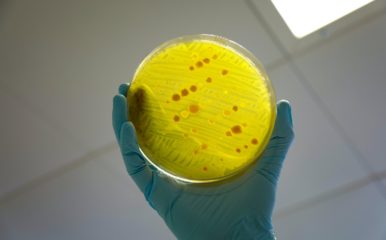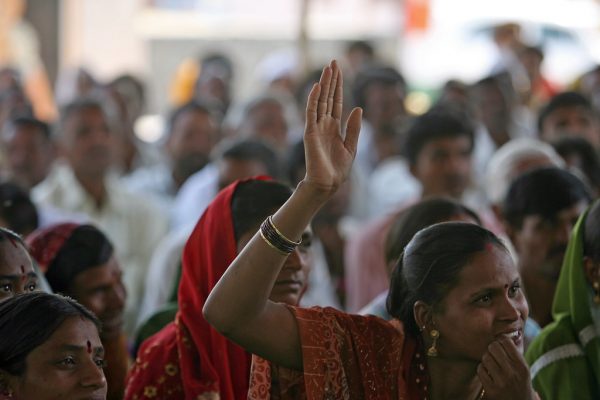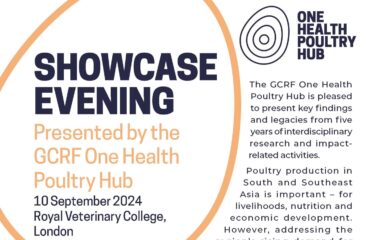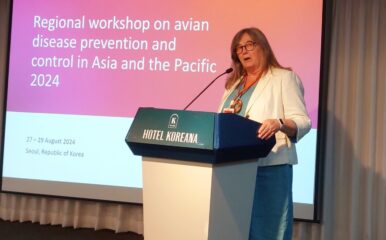
Hub partners to explore community engagement for tackling AMR
Published on 02/12/2020

Simone D. McCourtie/World Bank CC BY 2.0
View this page in:
VietnamesePartners in the GCRF One Health Poultry Hub will explore issues around community engagement for tackling antimicrobial resistance (AMR) in India as part of a UKRI Collective Fund award for a new GCRF Challenge Cluster networking project, CE4AMR: The One Health Approach.
The research will consider approaches which result in bespoke local solutions which align with community priorities and needs to address One Health drivers of AMR and will seek scalable and/or sustainable ways to tackle AMR challenges. It will also seek to identify effective ways to engage with national and international stakeholders to raise community engagement as a strategy to address AMR on national and global policy agendas.
Professor Fiona Tomley of RVC and Director of the Poultry Hub, and Poultry Hub co-investigator Professor Rajib Dasgupta, of Jawaharwal Nehru University, are co-investigators of the project, which champions the use of community engagement, participatory and creative approaches to tackle AMR in low- and middle-income countries. Although India has a National Action Plan for AMR with a focus on hospital infections and regulatory frameworks, there is less activity at community and grassroots level, including in the agricultural sector.
Networking cluster
CE4AMR: The One Health Approach is a networking cluster bringing together the expertise of six existing projects who use community engagement methods to tackle the issue of AMR in low- and middle-income countries (LMICs). The aim of the cluster is to synthesis learning across these projects and develop innovative research proposals which place community engagement methods at the forefront of AMR research across human, animal and environmental contexts (a One Health approach).
Outputs will include an open-access handbook discussing the ways community engagement methods can approach AMR, troubleshooting, key challenges and best practice in this area, plus case studies of projects in action.
The Cluster is based at the University of Leeds and includes co-investigators in the UK, Bangladesh, India, Nepal, Ghana, New Zealand and Vietnam. In addition to academic institutions, Cluster partners are based within NGOs and charitable groups. The diversity of the cluster is key to addressing the challenge of AMR in LMICs and provides a broad range of community engagement experience and knowledge.
AMR is a major challenge and threat to global health. The One Health Poultry Hub is considering AMR in its case study countries of Bangladesh, India, Sri Lanka and Vietnam, assessing microbial populations in the guts of chickens and measuring chicken exposure to antimicrobial drugs.
The World Health Organization (WHO) recommends complete restriction of antibiotic growth promoters (AGP) in livestock and poultry, however continued and inappropriate use, especially in poultry production, remains a major factor in the generation of resistant microbes, as well as their zoonotic transmission. This is attributed to ongoing, easy access for poultry farmers and others in the poultry industry to antimicrobials, for example in-feed antibiotic growth promoters (AGP) and for therapy, often without prescription and with incorrect usage and dosages.
Risky behaviours
While mechanisms leading to AMR are biological, risky behaviours are rooted in the social and economic factors surrounding poultry production and are influenced by people’s perceptions of disease hazards and the need to bring ‘healthy’ animals to market, as well as the efficiency and profitability of the sector.
Other factors affecting people’s behaviour include their experience and traditions, personal livelihoods, local peer support networks and community values, and external factors such as pricing, local governance and regulatory enforcement, and shocks such as the COVID-19 pandemic.
Other partners in CE4AMR: The One Health Approach are HERD International, ARK Foundation, ImaginationLancaster, University of Lancaster, London School of Hygiene and Tropical Medicine (LSHTM), University of Oxford Clinical Research Unit, Noguchi Memorial Institute for Medical Research and Indian Institute of Public Health.
Challenge Cluster funding is awarded to successful proposals that bring together current and/or former GCRF projects, along with associated partners from non-government organisations, industry, charity, civil society and other policymakers who have agreed to collaborate together to accelerate impact against a specific global challenge.


